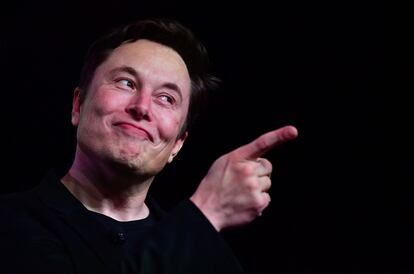Elon Musk’s biographer: ‘For him, chaos is standard operating procedure’
Ashlee Vance, the author of a biography on the richest man in the world, shares his thoughts about the controversy surrounding the magnate’s management of Twitter

On Elon Musk’s third date with his second wife, Talulah Riley, in the privacy of the hotel, he said he wanted to show her his rockets. “I was skeptical, but he did actually show me rocket videos,” Riley stated. Musk had ruled out two models in favor of the British actress because she “was really interested in talking about rockets and electric cars. That was the interesting thing,” the billionaire told his biographer Ashlee Vance, a Bloomberg journalist and author of Elon Musk: Tesla, SpaceX, and the Quest for a Fantastic Future.
When @ashleevance tells you something, believe him.
— BikingMzStacey❤️🔥🚲🌁 (@drivingmzstacey) November 18, 2022
That’s the tweet. pic.twitter.com/y36gImqiJg
But Musk’s penchant for using technology to flirt with women dates back to before his million-dollar investment in Tesla, the electric car manufacturer he co-founded. He was already using this ruse when he was 18 years old and had just arrived in Canada from his native South Africa. “I believe the second sentence out of his mouth was ‘I think a lot about electric cars,’” Christie Nicholson, who met the young Musk at a party and remains his friend, told Vance.
Musk has always been obsessively focused on his interests. Since he was young, he has been very interested in the internet (he founded X.com, which is the origin of Paypal and secure online payments), rockets (SpaceX) and electric cars (Tesla). His interest in social media and Twitter may seem new from the outside, but Musk has likely put many hours into thinking about it and believes, as he wrote to advertisers, that Twitter is not just a social network, but an essential “digital public square” for the future of humanity.
“Based on some messages we swapped back and forth, I do think he’s pretty stressed out,” Vance told EL PAÍS by phone. Since Musk officially bought Twitter on October 27, he has laid off thousands of employees, announced that former US president Donald Trump will be allowed back, and caused chaos with ill-considered decisions, leading many to herald the end of Twitter and move to other networks such as Mastodon.
A book by @ashleevance on @elonmusk published in 2015. One of the best books I've ever read. pic.twitter.com/2rhvY0o46o
— Kejetia Elon Musk (@KejetiaElon) November 20, 2022
Is this a big deal for Musk? Probably not. “For most people, this would be kind of an extraordinary situation. But for Elon, it’s kind of standard operating procedure to have a business in chaos,” said Vance. “The other thing I would say is if this just doesn’t work and Twitter totally collapses and his entire $40 billion-plus is wiped out, I don’t think he would be okay with it, but he’s probably the only person whose life wouldn’t be destroyed. I think he’s willing to take this risk and can live with the results either way.”
After all, Twitter is just one of Musk’s many projects. He is also working on Tesla’s hyperloop, a high-speed transportation system; the Optimus robot; as well as Neuralink’s brain chips, the results of which are all still to be determined. The indisputable success of PayPal, SpaceX and Tesla are not the only milestones of Musk’s career.
The great mystery of these first weeks of Twitter under Musk is how the company can survive with just 2,700 employees, more than 50% fewer than it had in October. There are several possible answers, with clues to be found both in what is happening today in Silicon Valley and in Musk’s past experience at SpaceX and Tesla. Twitter co-founder Jack Dorsey himself admitted to hiring too many people. Musk seemed to know this and still decided to buy the social media company. “I think people are underestimating him,” said Vance. “There’s so much talk of, ‘oh you’re losing all these great engineers.’ I think people are underestimating how much a lot of people are protesting Elon being there and his ability going forward to hire talented people.” Engineers on Twitter have already offered their help to solve complex problems, such as fixing Twitter’s search engine:
For Vance, it’s important to note that there is a big difference between Twitter, and SpaceX and Tesla: “He built those companies over time. They have very clear visions about what they mean to the world and where they’re going. His behavior, I think, is somewhat more tolerated because people are used to his management style. He’s still incredibly hard on some people and fires them in horrific fashion.”
Musk bought Twitter being the richest person in the world, and one of the most active users of the network. As a result, the interest in how he will run Twitter is different, said Vance: “He just parachuted in management style. And I think it’s obviously shocking to everyone at the company and outside of it.”
Examples of Musk’s erratic work behavior can also be found at Tesla and SpaceX. In his biography of Musk, for which he interviewed hundreds of people, Vance recounted some notable cases. “One person putting in a 16-hour day ends up being much more effective than two people working eight-hour days together,” he writes. “The individual doesn’t have to hold meetings, reach a consensus, or bring other people up to speed on a project. He just keeps working and working and working. The ideal SpaceX employee is someone like Steve Davis, the director of advanced projects at SpaceX. ‘He’s been working sixteen hours a day every day for years,’ Brogan [another SpaceX employee] said. ‘He gets more done than eleven people working together.’”
Weekends are also an obstacle for Musk, according to Vance’s biography. “When Musk came into the meeting room where I’d been waiting, I noted how impressive it was for so many people to turn up on a Saturday,” he writes. “Musk saw the situation in a different light, complaining that fewer and fewer people had been working weekends of late. ‘We’ve grown fucking soft,’ Musk replied. ‘I was just going to send out an email. We’re fucking soft.’”
The billionaire accepted few excuses for missing work, not even the birth of a child counted. Vance writes: “One [Tesla] employee missed an event to witness the birth of his child. Musk fired off an email saying, ‘That is no excuse. I am extremely disappointed. You need to figure out where your priorities are. We’re changing the world and changing history, and you either commit or you don’t.’” In this instance, Vance quoted the recipient of the email, but did not see the specific message.
“I guess we should hire some more people”
At X.com, a group of executives left with a substantial part of the workforce over a disagreement over Musk’s management. “Musk ended up with a shell of a company and a handful of loyal employees,” writes Vance, who spoke to Julie Ankenbrandt, an early X.com employee who stayed at the company, about the situation. “There were a million laws in place to block something like X.com from happening, but Elon didn’t care. He just looked at me and said, ‘I guess we should hire some more people.’”
Musk’s stubbornness when faced with failure is also underestimated. In 2008, his SpaceX rockets weren’t taking off and building a Tesla electric car on time seemed like a pipe dream. The crisis meant he was about to lose all the money he had earned from selling PayPal to eBay. “One day, there were 50 articles about how Tesla will die,” said Kimbal Musk, Elon Musk’s younger book, according to Vance’s biography.
The risk of Twitter failing is much higher, but Musk’s business empire does not depend on the social media company. Even so, Musk does not accept failure. In the biography, Vance quotes Jeff Heilman, an early employee of Musk’s first internet services company, Zip2. “‘Elon had this drive that this thing – whatever it was – had to get done and that if he didn’t do it, he’d miss his shot,’ Heilman said. ‘I think that’s what the VCs saw – that he was willing to stake his existence on building out this platform.’ Musk actually said as much to one venture capitalist, informing him, ‘My mentality is that of a samurai. I would rather commit seppuku [ritual suicide] than fail.’”
Another element that makes Musk stand out from other entrepreneurs is his willingness to reinvest large sums of money in new projects. In the most difficult years of SpaceX and Tesla, when he was still living with his first wife, Justine, he told Antonio Gracias, a friend and investor in his companies: “I will spend my last dollar on these companies. If we have to move into Justine’s parents’ basement, we’ll do it,” according to the biography.
Musk’s political leanings
Since Musk bought Twitter, there has been growing speculation about his political leanings, specifically whether he is right-wing. “I think it’s stupid,” Vance told EL PAÍS. “Some of this he’s brought on himself, with things that he says in tweets. But people have to understand, most of the time he’s trolling just to sit back to stir the pot. He’s not a radical fascist or anything like that. He’s pretty rational, and his political allegiances tend to shift with how his companies are being treated by the government at any given time. He’s eccentric and he likes to stir the pot, but in my opinion, he is not pro far right. I don’t buy that.”
Killer vacations
Musk nearly died on a trip to Africa, where he caught a type of severe malaria. It was discovered late on his return to the United States, and Musk spent 10 agonizing days in intensive care. It took him six months to recover and lost 20 kilos during the illness. “I came very close to dying,” Musk told Vance. “That’s my lesson for taking a vacation: vacations will kill you.”
Sign up for our weekly newsletter to get more English-language news coverage from EL PAÍS USA Edition.
Tu suscripción se está usando en otro dispositivo
¿Quieres añadir otro usuario a tu suscripción?
Si continúas leyendo en este dispositivo, no se podrá leer en el otro.
FlechaTu suscripción se está usando en otro dispositivo y solo puedes acceder a EL PAÍS desde un dispositivo a la vez.
Si quieres compartir tu cuenta, cambia tu suscripción a la modalidad Premium, así podrás añadir otro usuario. Cada uno accederá con su propia cuenta de email, lo que os permitirá personalizar vuestra experiencia en EL PAÍS.
¿Tienes una suscripción de empresa? Accede aquí para contratar más cuentas.
En el caso de no saber quién está usando tu cuenta, te recomendamos cambiar tu contraseña aquí.
Si decides continuar compartiendo tu cuenta, este mensaje se mostrará en tu dispositivo y en el de la otra persona que está usando tu cuenta de forma indefinida, afectando a tu experiencia de lectura. Puedes consultar aquí los términos y condiciones de la suscripción digital.









































